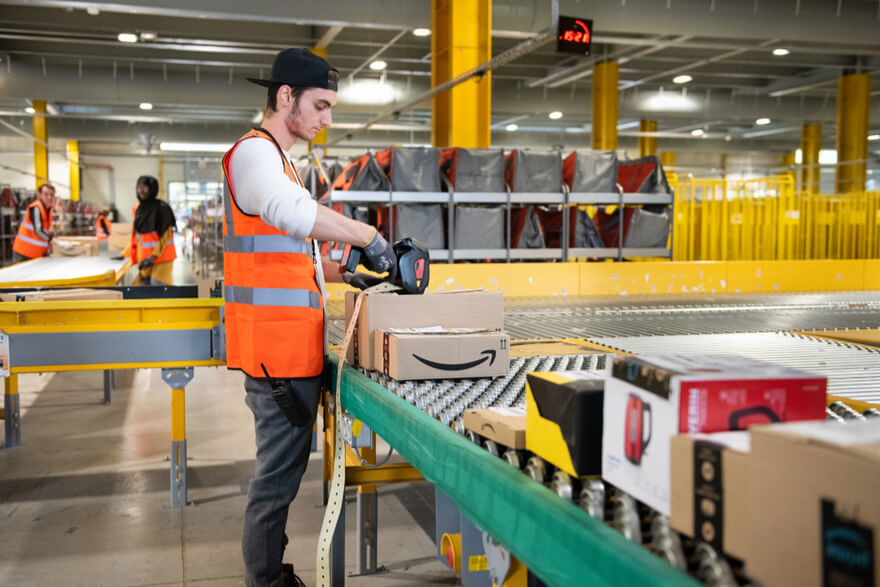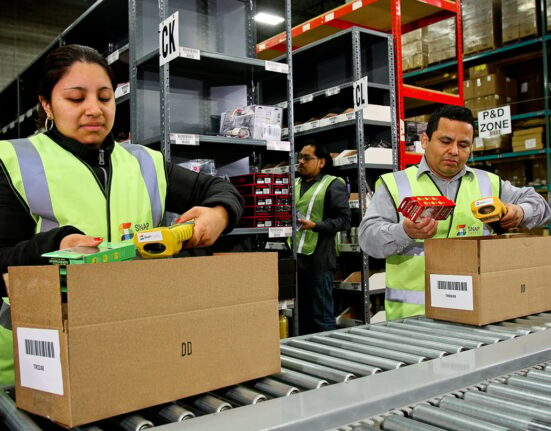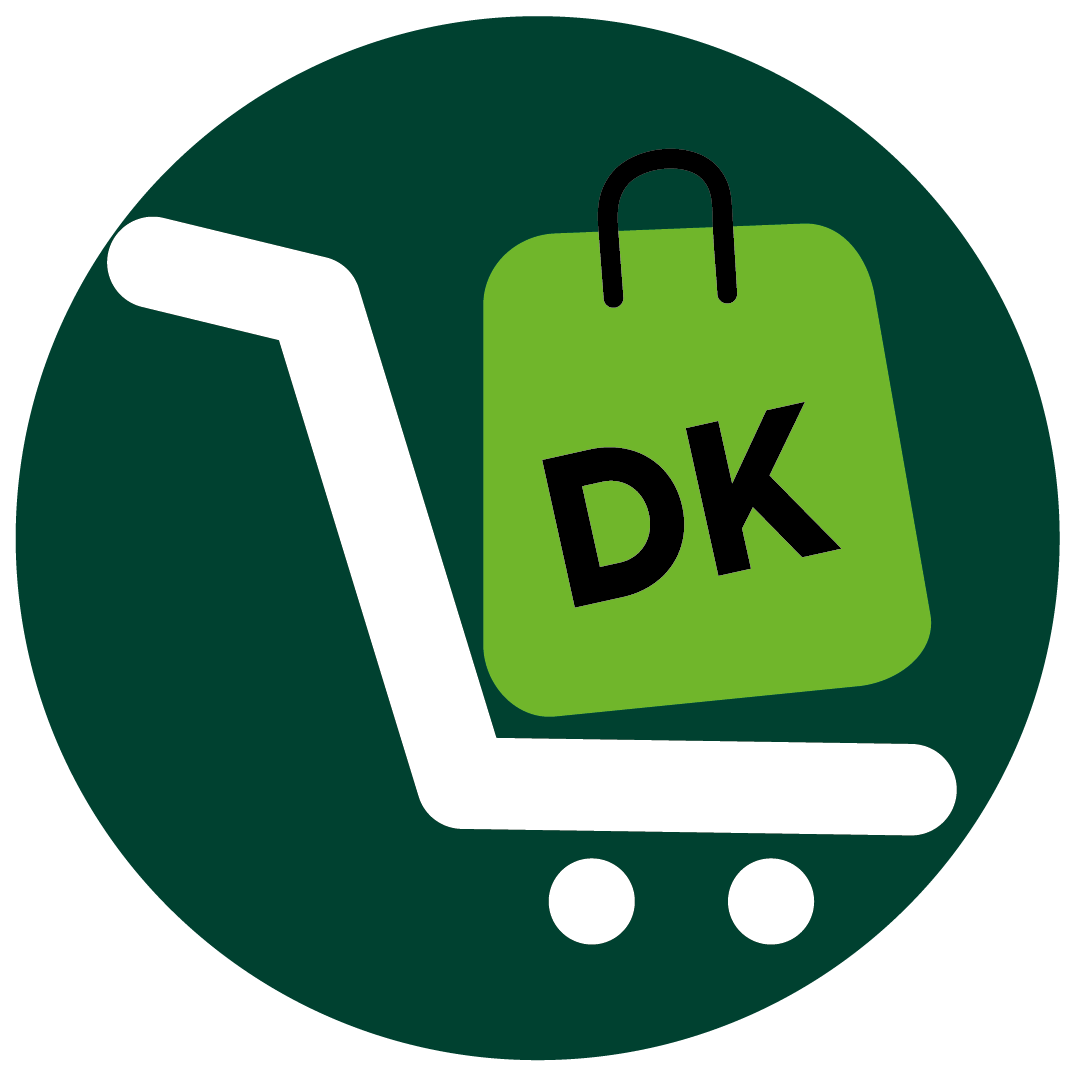Our Verdict

Amazon FBA (Fulfillment by Amazon) and ShipMonk both do amazing fulfillment services, but Amazon FBA gives you more value because:
- Your products become eligible for Amazon Prime, offering fast shipping options that can significantly boost sales.
- You gain access to Amazon’s vast customer base, increasing your product visibility and potential sales.
- FBA products are often prioritized for the Buy Box on Amazon, which can lead to higher sales.
- Amazon’s extensive global fulfillment network allows for faster and more efficient international shipping.
- Products fulfilled by Amazon often benefit from higher customer trust due to Amazon’s reputation for reliable service.
- Amazon handles all customer service and returns, saving you time and effort.
ShipMonk, on the other hand, is a more flexible option for you, if your business sells on multiple platforms. It allows you to customize your packaging and branding, which can help build your brand. ShipMonk also offers real-time inventory tracking, giving you better control over your stock. However, it doesn’t provide the same visibility and sales boost that comes with being on Amazon’s marketplace.
Your choice depends on your business needs.
So, what do you consider more valuable to your business?
Choose Amazon FBA for benefits like Prime eligibility, access to Amazon’s vast customer base, and comprehensive customer service, making it ideal for boosting sales and leveraging Amazon’s logistics network. Go for ShipMonk instead if you prefer flexible fulfillment solutions with advanced inventory management, multichannel integration, and scalability, making it suitable for customized logistics across various platforms.
Why Choose Amazon FBA

Who Amazon FBA Is Best For
Amazon FBA is perfect for:
- Sellers of Small and Lightweight Products: Use Amazon FBA if you sell small, lightweight products. The cost-effectiveness of FBA is ideal for these items.
- Busy Entrepreneurs: Opt for Amazon FBA if you don’t have the time or capacity to package and ship orders yourself. FBA handles these tasks efficiently.
- Sellers Wanting Prime Eligibility: Choose Amazon FBA if you want your products to be eligible for Amazon Prime. This can significantly boost your sales.
- Those Preferring Outsourced Customer Service: Utilize Amazon FBA if you want Amazon to handle customer service and returns. This can save you time and effort.
- Space-Constrained Sellers: Go with Amazon FBA if you cannot afford your own warehouse space or employees to manage inventory. FBA provides the necessary storage and logistics.
- Sellers in High-Competition Categories: Leverage Amazon FBA if you are selling fast-moving products in competitive categories. FBA helps you stay ahead with efficient fulfillment1
Who Amazon FBA Is Not Right For
Amazon FBA is not the right choice for:
- Sellers of Very Large and/or Heavy Products: Avoid Amazon FBA if you sell very large and/or heavy products. The storage and shipping fees for large items can be prohibitively expensive.
- Sellers Wanting Control Over Shipping: Do not use Amazon FBA if you want control over your shipping process. FBA handles all shipping, so you won’t have control over packaging and delivery methods.
- Businesses with Their Own Warehouse: Skip Amazon FBA if you have your own warehouse and fulfillment capabilities. If you already have the infrastructure, FBA might be an unnecessary expense.
- Sellers Preferring to Process Returns Themselves: Refrain from using Amazon FBA if you prefer to process returns yourself. FBA manages returns, which means you won’t handle customer returns directly.
- Users of Third-Party Fulfillment Services: Avoid Amazon FBA if you use a third-party fulfillment service. If you’re already satisfied with another fulfillment service, switching to FBA might not be beneficial.
Why Choose ShipMonk

Who ShipMonk Is Best For
ShipMonk is best for:
- Small and Medium-Sized Businesses: Use ShipMonk if you need comprehensive order fulfillment solutions tailored to your business size.
- Multichannel eCommerce Sellers: Opt for ShipMonk if you sell across multiple platforms like Amazon, eBay, and Etsy.
- Subscription Box Services: Choose ShipMonk if you offer subscription boxes, as they have specialized batch fulfillment programs.
- Crowdfunding Projects: Utilize ShipMonk if you need fulfillment for crowdfunding campaigns.
- Amazon Sellers: Leverage ShipMonk if you need FBA prep and Seller Fulfilled Prime eligibility.
- International Sellers: Go with ShipMonk if you require international delivery duty paid (DDP) services.
Who ShipMonk Is Not Right For
ShipMonk is not right for:
- Sellers of Hazardous Materials: Avoid ShipMonk if you deal with hazardous materials. They have restrictions and complications with shipping such items.
- Businesses Requiring Custom Reporting: Do not use ShipMonk if you need advanced or custom reporting. Their standard reports are basic, and custom reports come at an additional cost.
- Sellers with Large, Heavy Items: Skip ShipMonk if you sell large, heavy items. The storage and handling fees can be high, and their system may not be optimized for such products.
- Companies Needing Immediate Support: Refrain from using ShipMonk if you require prompt customer support. Response times can be slow, especially for complex issues.
- Businesses with Specific Packaging Requirements: Avoid ShipMonk if you have unique packaging needs. They may not accommodate special packaging requests effectively
Amazon FBA vs. ShipMonk: Main Differences
Ideal For
Amazon FBA is ideal for you if you want to leverage Amazon’s vast customer base and enjoy the benefits of Prime eligibility, which can significantly boost your sales. It handles all logistics, including picking, packing, shipping, and customer service, allowing you to focus on other aspects of your business. This streamlined process can save you time and reduce operational headaches, making it easier to scale your business. Additionally, FBA’s global reach and reliable shipping services ensure that your products can reach customers quickly and efficiently
ShipMonk is ideal for you if you sell on multiple platforms and need flexibility in your fulfillment process. It offers customizable packaging and branding, which can help you create a unique customer experience and build brand loyalty. ShipMonk also provides real-time inventory tracking, giving you better control over your stock. Additionally, it supports scalability, allowing your business to grow without worrying about fulfillment constraints. With multiple warehouses, ShipMonk can reduce shipping costs and improve delivery times, making it a cost-effective solution for your e-commerce needs
Plans and Pricing
Amazon FBA

- Individual Plan: $0.99 per item sold.
- Professional Plan: $39.99 per month.
- Fulfillment Fees: Vary based on item size, weight, and storage duration.
- Storage Fees: Monthly fees based on the volume of inventory stored.
ShipMonk

- Subscription Box Fulfillment: Starts at $.00 per order.
- E-commerce Fulfillment: Starts at $.50 per order.
- Retail Fulfillment: Starts at $.50 per order.
- Amazon FBA Preparation Services: Starts at $.50 per order.
- Storage Fees: Tiered pricing based on bin and pallet sizes..
Accounting Integration
Amazon FBA integrates seamlessly with popular accounting software such as QuickBooks and Xero, and ShipMonk also provides strong integration capabilities with leading payroll providers including QuickBooks, Xero, Gusto, Paychex, and ADP. ShipMonk, on the other hand, offers integration with over 75 e-commerce platforms and tools, including QuickBooks and Xero.
Standout Features
Amazon FBA stands out for its ability to offer fast, free shipping through Amazon Prime, which can significantly boost your sales and customer satisfaction. It handles all aspects of order fulfillment, including picking, packing, shipping, customer service, and returns, allowing you to focus on other parts of your business. Additionally, FBA provides access to Amazon’s extensive global fulfillment network, enabling you to reach customers worldwide. Programs like Subscribe & Save and Multi-Channel Fulfillment (MCF) further enhance your sales opportunities and customer loyalty.
ShipMonk excels with its advanced technology and integration capabilities, offering over 75 e-commerce platform integrations for seamless order management. It provides customizable packaging and branding options, helping you create a unique customer experience. With multiple warehouses across the US, Canada, Mexico, and Europe, ShipMonk ensures faster delivery times and reduced shipping costs. Additionally, it offers real-time inventory tracking and management, scalability to support business growth, and dedicated customer support through “Happiness Engineers”. These features make ShipMonk a versatile and efficient fulfillment solution for e-commerce businesses.
Amazon FBA vs. ShipMonk: Standout Features Amazon FBA

Outstanding features of Amazon FBA include:
- Give access to its vast customer base.
- Offers fast, free shipping with Prime eligibility.
- Streamlines logistics, including picking, packing, shipping, and customer service.
- Reaches customers globally with Amazon’s extensive fulfillment network.
- Utilizes programs like Subscribe & Save and Multi-Channel Fulfillment (MCF).
- Reduces operational workload, allowing focus on other business aspects.
- Ensures reliable and efficient shipping services.
ShipMonk

Here are the features that make ShipMonk outstanding:
- Supports selling on various e-commerce platforms.
- Customizes packaging and branding to create a unique customer experience.
- Tracks inventory in real-time and manage it efficiently.
- Scales your business with flexible solutions.
- Reduces shipping costs and improve delivery times with multiple warehouses.
- Integrates advanced technology to streamline order fulfillment.
- Offers dedicated customer support through “Happiness Engineers.”
Pros and Cons of Amazon FBA

- Pros
- Provides access to Amazon’s vast customer base.
- Offers fast, free shipping with Prime eligibility.
- Streamlines logistics, including picking, packing, shipping, and customer service.
- Reaches customers globally with Amazon’s extensive fulfillment network.
- Utilizes programs like Subscribe & Save and Multi-Channel Fulfillment (MCF).
- Reduces operational workload, allowing focus on other business aspects.
- Ensures reliable and efficient shipping services.
- Cons
- Incurs higher operational costs due to storage, handling, and other logistical fees.
- Provides less control over inventory, relying on Amazon’s systems and processes.
- Limits branding options, as Amazon controls packaging and presentation.
- Charges long-term storage fees for slow-moving inventory.
- Restricts certain products, including hazardous materials.
- Complicates managing multi-channel sales, as it is optimized for Amazon.
- Imposes capacity limits that can restrict the amount of inventory you can store.
Pros and Cons of ShipMonk

- Pros
- Supports selling on various e-commerce platforms.
- Customizes packaging and branding to create a unique customer experience.
- Tracks inventory in real-time and manages it efficiently.
- Scales your business with flexible solutions.
- Reduces shipping costs and improves delivery times with multiple warehouses.
- Integrates advanced technology to streamline order fulfillment.
- Provides dedicated customer support through “Happiness Engineers”.
- Cons
- Limits some features to more expensive plans.
- Challenges users with correcting errors when employees forget to clock in or out.
- Experiences occasional glitches, especially with the mobile app.
- Caters primarily to U.S. businesses, with limited support for international payroll.
- Requires upgrades to track multiple role types (hourly vs. salaried) effectively.
- Fails to always notify staff of schedule changes.
- Restricts payroll payments to USD, which may not be suitable for international businesses.
Amazon FBA vs. ShipMonk: Customer Reviews
Amazon FBA generally receives positive reviews for its extensive customer base and streamlined logistics. On G2, it has a rating of 4.4 out of 5 stars, with 64% of users giving it 5 stars. Fit Small Business scored it 3.54 out of 5, based on pricing, functionality, specialty services, and ease of use. Jungle Scout highlights its profitability and access to a large customer base, although some users mention higher operational costs as a downside.
ShipMonk also garners favorable reviews, particularly for its customer service and ease of use. Trustpilot rates it at 4.2 out of 5 stars, with 71% of users giving it 5 stars. Capterra gives it a 4.1 out of 5, praising its ease of use and customer service. Sitejabber users rate it 4.3 out of 5 stars, often highlighting the quality of customer support. However, some reviews mention issues with service quality and difficulties in terminating services.
Amazon FBA and Shipmonk Competitors
- ShipBob: ShipBob is a leading fulfillment service that offers e-commerce businesses fast and reliable shipping solutions. It provides a network of fulfillment centers across the US, enabling businesses to reduce shipping costs and delivery times. ShipBob integrates with major e-commerce platforms like Shopify, WooCommerce, and BigCommerce, offering real-time inventory tracking and order management. Its customizable packaging options help businesses maintain their brand identity while ensuring efficient fulfillment.
- Deliverr: Deliverr specializes in fast and affordable fulfillment services, focusing on two-day and next-day delivery options. It integrates seamlessly with major marketplaces like Amazon, Walmart, and eBay, as well as e-commerce platforms such as Shopify and BigCommerce. Deliverr’s transparent pricing model and no long-term contracts make it an attractive option for businesses looking for flexibility and cost-effectiveness. Its predictive analytics help optimize inventory placement and reduce shipping times.
- ShipStation: ShipStation is a web-based shipping software that simplifies order fulfillment for e-commerce businesses. It integrates with over 100 marketplaces and shopping carts, including Amazon, eBay, and Shopify. ShipStation offers features like batch label printing, automated shipping rules, and branded tracking pages. Its user-friendly interface and robust reporting tools help businesses streamline their shipping processes and improve efficiency.
- com: Fulfillment.com provides global order fulfillment services with a focus on scalability and efficiency. It offers a network of strategically located fulfillment centers worldwide, enabling businesses to reach customers quickly and cost-effectively. Fulfillment.com integrates with popular e-commerce platforms and marketplaces, providing real-time inventory management and order tracking. Its advanced technology and dedicated customer support make it a reliable choice for growing businesses.
- eFulfillment Service: eFulfillment Service is a family-owned and operated fulfillment company that caters to small and medium-sized businesses. It offers a range of services, including order fulfillment, inventory management, and returns processing. eFulfillment Service is known for its transparent pricing, no long-term contracts, and commitment to customer satisfaction. It integrates with major e-commerce platforms and provides real-time order tracking and reporting
>>> GET SMARTER : How to Sell on eBay Without Inventory
Pro Tips
Here are some pro tips to help you make an informed decision:
- Evaluate Your Sales Channels: If you primarily sell on Amazon, FBA might be the better choice due to its seamless integration and access to Amazon’s vast customer base. If you sell on multiple platforms, ShipMonk offers more flexibility and integration options.
- Consider Your Branding Needs: If maintaining control over your packaging and branding is important, ShipMonk’s customizable options can help you create a unique customer experience. Amazon FBA has more standardized packaging, which might limit your branding efforts.
- Analyze Your Budget: Compare the costs associated with each service, including storage, fulfillment, and additional fees. Amazon FBA can be more expensive due to its comprehensive services, while ShipMonk might offer more cost-effective solutions, especially for multi-channel sellers.
- Assess Your Inventory Management: If real-time inventory tracking and management are crucial for your business, ShipMonk’s advanced technology and inventory control might be more beneficial. Amazon FBA also offers inventory management but with less control over the process.
- Think About Scalability: Consider your long-term business goals and how each service can support your growth. Amazon FBA provides a robust infrastructure for scaling within Amazon’s ecosystem, while ShipMonk offers scalable solutions for businesses selling across various platforms
Recap
Amazon FBA and ShipMonk, both offer great fulfillment services but cater to different needs. Amazon FBA allows you as a seller to outsource your order fulfillment to Amazon, which includes storing products, handling packaging and shipping, managing customer service, and making products eligible for Amazon Prime. ShipMonk, on the other hand, is a third-party logistics provider offering services such as inventory management, order fulfillment, warehousing, and integration with various e-commerce platforms to streamline operations.
To decide between Amazon FBA and ShipMonk, consider your sales channels and branding needs. Amazon FBA is ideal if you primarily sell on Amazon, as it provides access to Amazon’s vast customer base, Prime eligibility, and streamlined logistics, including picking, packing, shipping, and customer service, which boosts your sales. However, it can be more expensive and offers less control over packaging and branding. ShipMonk, on the other hand, suits you better if your business sells on multiple platforms. It offers more flexibility with customizable packaging, real-time inventory tracking, and flexible solutions which helps you build a stronger brand identity. While it may not provide the same visibility boost as Amazon, it allows for greater control over your brand and can be more cost-effective.
Consider your specific business needs, budget, and long-term goals—if you want to tap into Amazon’s customer base and have streamlined logistics, go with FBA. But if you need more control over your branding and sell on various platforms, ShipMonk could be the better choice.














